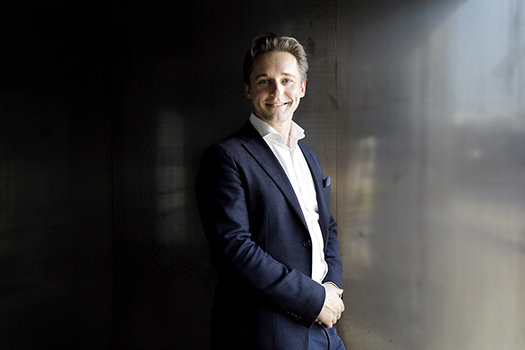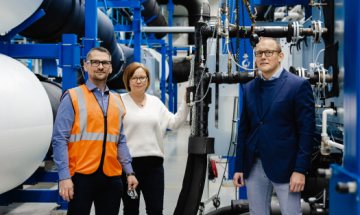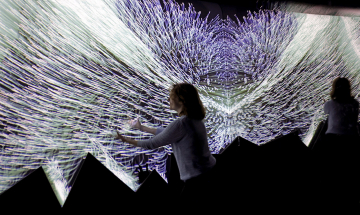
The data overhaul will boost exports and provide work for Finland – SSAB offers green digital modernisation projects for industry as EU recovery projects
If the decision were in the hands of Niko Korte, SSAB’s Director of Digital Business Development, some of the money provided by the EU’s recovery fund would be allocated to projects that will help to realise the industrial data overhaul.
Sorry, what do you mean?
“We already have almost all of the data we could need concerning production and business in the process industry. We have information, but the challenge is that the data is scattered here and there, in systems ranging from old IT solutions to artificial intelligence. In order to consolidate all this data into a form that could improve production overall, we need a data overhaul,” Korte explains.
Steel production is, therefore, not only about producing steel.
When we make a tonne of steel, we also generate a gigabyte of data. We are also data production machines.
“When we make a tonne of steel, we also generate a gigabyte of data. We are also data production machines.”
SSAB is constantly working on various artificial intelligence projects related to increasing machine efficiency and extending the service lifetimes of machinery, preventive maintenance and operational reliability, reducing waste, and forecasting the delivery reliability of finished steel, among other things. The enormous amount of data and variables related to these different processes needs to be consolidated into readily available and usable information, and we need a data overhaul to enable this.
“Finland’s process industry would stand to gain a huge advantage in the use of artificial intelligence if all of the existing data could be made more available on every production line. Building an artificial intelligence model is only 20 per cent of the project, and it is not difficult for a large company. The most difficult aspects are getting the data for artificial intelligence to use and linking it to business processes. This enables scaling and genuine benefits,” Korte says.
FUNDING IS REQUIRED BECAUSE THE CORONAVIRUS IS HOLDING BACK EVEN THE GOOD PROJECTS
In July, the European Council agreed on a recovery package worth EUR 750 billion. The package consists of several programmes for which the EU Member States must prepare national investment plans this autumn.
The package will not involve directly subsidising companies; instead, Member States will apply for funding for various projects. The European Parliament requires projects to focus on improving European competitiveness, sustainable development and promoting digitalisation. SSAB’s projects meet these requirements because digital modernisations also lead to lower emissions. Finland’s handprint will also expand as Finnish products and services that help to curb climate change give rise to new export opportunities.
The use of artificial intelligence must progress from individual pilot projects to a situation in which data usage can be scaled. “All too often, people claim to have conducted a good pilot project, but they fail to link data to business processes,” Niko Korte says.
“If this type of EU funding instrument were now in use, modernisations would take competitiveness to a significantly higher level. Competition is international, competition is tough, and we want to be competitive,” Korte says.
If SSAB had additional funding, it could launch up to eight different digitalisation and low-carbon modernisations immediately.
“We have a long list of financially viable projects that would increase Finland’s competitiveness and employment. However, we cannot even get good projects off the ground because the economic outlook is so uncertain due to the coronavirus. Now would be the perfect time to kick-start development, but even large companies need to think twice in the face of an unforeseen global situation.”
NEW EXPERTISE AND PARTNERS REQUIRED FOR PROJECTS
New expertise is required for SSAB’s projects.
“We have an immediate and permanent need for new recruits. As these projects would involve investments, we would also use subcontractors, such as software companies, and they would be in a good position to recruit workers. In addition, we would be keen to share data with other companies in the same ecosystem. This would also create jobs for subcontracting networks.”
It is often feared that digitalisation and robotics will reduce the number of jobs. Korte rejects this theory.
We have 40 robots operating in our robotics programme. Some of the personnel have been assigned to new roles. Instead of supervising processes, they have become robot trainers, robot masters.
“We have 40 robots operating in our robotics programme. They have affected human resources in the sense that we have recruited additional people, and some of the personnel have been assigned to new roles. Instead of supervising processes, they have become robot trainers, robot masters.”
In Korte’s opinion, top experts spend too much time on operational work. If data and robots could carry out operational work, experts could do the work that they enjoy most and that benefits the company over the long term.
“The same logic applies in every sector,” Korte points out.
DATA PROJECTS HAVE A DIRECT EFFECT ON EMISSION REDUCTION
Data projects have a direct effect on carbon dioxide emissions as they can help to fine-tune production, leading to less waste, better machine utilisation rates, less material consumption, and more highly-optimised transportation than at present.
“These projects include a nice combination: competitiveness goals go hand-in-hand with employment and reduced emissions,” Korte says.
Niko Korte hopes that RDI funding regulations will be adjusted to provide more support for digitalisation projects as well. “As part of the coronavirus recovery, could we experiment with granting investment aid also for the development of digital products or services?”
SSAB’s projects would also accelerate the promotion of digitalisation.
“As our digital capability grows, we will be better able to challenge our suppliers and customers. As such, the benefits of digitalisation modernisations will begin to trickle down and expand across industry more broadly.”
According to Korte, one advantage that Finland holds over other countries is a greater level of trust between entities. This would allow Finland to transform data usage into a competitive advantage before competing countries are able to do so.
“We have established production chains in industry. If we could get our data management practices in order and arrange operating methods for sharing data between different companies, we could create an industrial data bubble that would serve as a testbed. Germany has built such an Industrial Dataspace ecosystem. We need to act more swiftly or risk being overtaken soon,” Korte warns.
Text: Marjo Ollikainen
Photos: Liisa Takala





